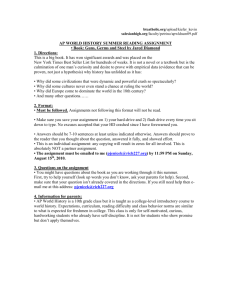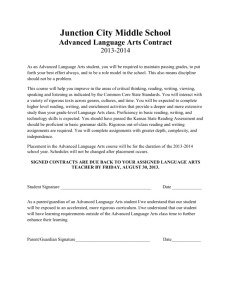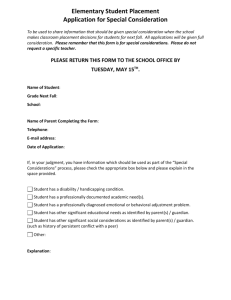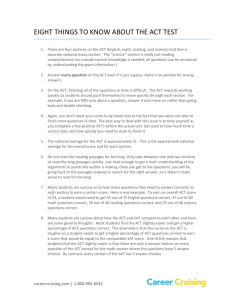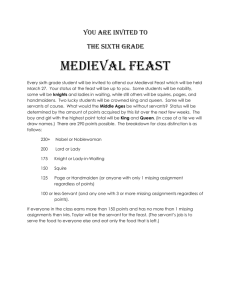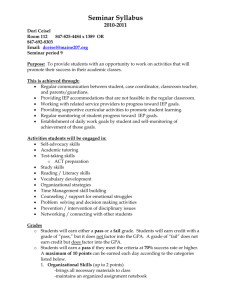1 AP Teacher: Mr. Cegielski Due: FIRST DAY OF CLASS
advertisement
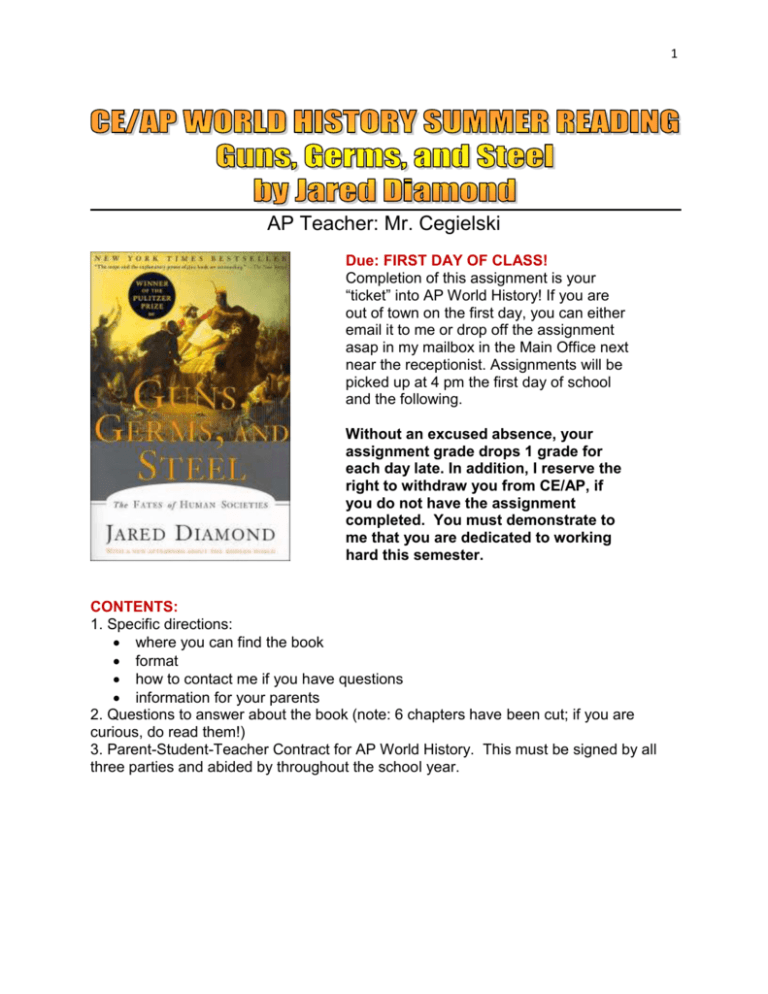
1 AP Teacher: Mr. Cegielski Due: FIRST DAY OF CLASS! Completion of this assignment is your “ticket” into AP World History! If you are out of town on the first day, you can either email it to me or drop off the assignment asap in my mailbox in the Main Office next near the receptionist. Assignments will be picked up at 4 pm the first day of school and the following. Without an excused absence, your assignment grade drops 1 grade for each day late. In addition, I reserve the right to withdraw you from CE/AP, if you do not have the assignment completed. You must demonstrate to me that you are dedicated to working hard this semester. CONTENTS: 1. Specific directions: where you can find the book format how to contact me if you have questions information for your parents 2. Questions to answer about the book (note: 6 chapters have been cut; if you are curious, do read them!) 3. Parent-Student-Teacher Contract for AP World History. This must be signed by all three parties and abided by throughout the school year. 2 Introduction and Directions: Guns, Germs, and Steel is a big and ambitious book. It has won significant awards and was placed on the New York Times Best Seller List for hundreds of weeks. Obviously, people other than incoming AP WH students are reading it! It is not a novel or a textbook but is the culmination of one man’s curiosity and desire to prove with empirical data (evidence that can be proven, not just a hypothesis) why history has unfolded as it has: Why did some civilizations that were dynamic and powerful crash so spectacularly? Why did some cultures never even stand a chance at ruling the world? Why did Europe come to dominate the world in the 18th century? And many other questions…… The author is what we can call a “polymath”: He is curious and knowledgeable about a wide range of topics. Google his name and take a look at some of the other books he wrote. You’ll probably be asking why we didn’t read THAT book he wrote….!!. He did not write this book for teenagers so you might find parts of it difficult. When you do, ask your parents or older siblings what they think about your question. It is a good book to talk about because it has interesting information and controversial theories. Where can you find the book? (paperback & hardcover) Public library Many used book stores Any large book store/chain Online at Amazon.com Format: must be followed. Assignments not following this format will not be read. Make sure you save your assignment on 1) your hard-drive and 2) flash drive every time you sit down to type. No excuses accepted that your HD crashed since I have forewarned you. Retype the question above your answer. Answers should be 7-10 sentences at least unless indicated otherwise. Answers should prove to the reader that you thought about the question, answered it fully, and showed effort. Font size 10 or 12, New York, Geneva or Arial, single-spaced & NO plastic covers or binders; just staple it This is an individual assignment: any copying will result in zeros for all involved. This is absolutely NOT a partner assignment. A low score will draw scrutiny to your assignment. No partial assignments are accepted. Questions? You might have questions about the book as you are working through it this summer. First, try to help yourself (look up words you don’t know, Google terms or ideas, ask your parents for help). Second, make sure that your question isn’t already covered in the directions. If you still need help then e-mail me at this address: cegielksio@cvamail.com. 3 INFORMATION FOR PARENTS: CE/AP World History is a 10-11th grade class but it is taught as a college-level introductory course to World History. Expectations, curriculum, reading difficulty and class behavior norms are similar to what is expected for freshmen in college. An hour of homework per night is normal. This class is only for self-motivated, curious, hardworking students who already have self-discipline. It is not for students who show promise but don’t apply themselves. If you know your student has reading difficulties then maybe this class is not a good fit because the reading level is quite high and students can’t just get by on what is covered in class. What to expect: We will read most, if not all of the textbook. For honors and AP students, it is highly recommended that students take the three hour AP exam in May: 70 multiple choice questions + three 45 minute essays to write. There is a required $100 fee (Please talk to me or the school if you have concerns about this). College credit is not automatic; students must typically earn at least a 3 on a scale of 1-5 to earn college credit. (If your child does pass, it will save you a lot on college tuition in the long run.) Motivation for taking this class should not be the weighted grade; there must be intrinsic interest in history. Parents, please help your students by also becoming students of history: talk about the topics that come up as the class unfolds. A good place to start is with the summer assignment; maybe you want to read it, too? Encourage your students to fully utilize the AP College Board website for help: http://apcentral.collegeboard.com/apc/public/courses/descriptions/index.html. Go to the link “World History” and download the PDF document for a full description and sample AP World Exam questions. ***If, after looking over this summer assignment information, you think this class might be beyond the scope of your student for next year then please call the main office or contact me via email as soon as possible so that your student can be rescheduled into the regular World History class. Sometimes students are ready for an CE/AP class their sophomore year and sometimes not until their junior year. 4 SUMMER READING ASSIGNMENT QUESTIONS: PLEASE RETYPE THE QUESTION AND THEN RESPOND AS PROMPTED: 1. Research Write a short (1/2 page) biography of the author; include information about his areas of research, books written, and prizes awarded. 2. Preface The author suggests that the roots of western Eurasian dominance in the modern world lie in what? Why has he chosen to write this book in this style and manner? 3. Prologue According to the author, why did human development proceed at different rates on different continents? What is his personal view on civilized and progressive societies versus hunter-gatherers societies? CHAPTER QUESTIONS. PLEASE RETYPE THE QUESTION AND THEN RESPOND AS PROMPTED. NOTE THAT SOME CHAPTERS HAVE BEEN CUT: Chapter 1: Up to the Starting Line What was the Great Leap Forward? Describe the life of a Cro-Magnon person. What impact did the arrival of humans have on big animals? Provide an example. Which continent had a head start in 11,000 BCE (Before Common Era = BC). Why? Chapter 2: A Natural Experiment of History Explain the difference between the Moriori and the Maori. Who conquered whom and why? What lessons can be learned by the pattern of dispersion of the Polynesians? Chapter 3: Collision at Cajamarca (VIC-very important chapter) Write a paragraph explaining your views on the event of November 16, 1532. What strikes (pun!) you the most about this event? Why did Pizarro succeed? Chapter 4: Farmer Power Write a paragraph explaining the chart. Do you agree with the author’s conclusions? What advantages are gained by being the first to domesticate animals? Chapter 5: History’s Haves and Have Nots CUT Chapter 6: To Farm or Not to Farm CUT Chapter 7: How to Make an Almond CUT 5 Chapter 8: Apples or Indians (VIC-see chapter 3 for what it means) Why was the Fertile Crescent predisposed to have such a potent head start in so many areas of development: writing, cities, and empires? What reasons does the author give for cannibalism in New Guinea? Chapter 9: Zebras, Unhappy Marriages, and the Anna Karenina Principle Identify and define the Ancient Fourteen. What is domestication? Which animals most helped Eurasians? Chapter 10: Spacious Skies and Tilted Axis Why did people who lived on an east-west axis become the world’s conquerors? What was it about the Americas and Africa that put these two continents at a developmental disadvantage? Chapter 11: Lethal Gift of Livestock (VIC) In what way can the gift of livestock be lethal? What was the role of disease in the exploration of Hernando de Soto? Chapter 12: Blueprints and Borrowed Letters Why is writing an agent of conquest according to the author? Why did some people NOT develop writing? Chapter 13: Necessity’s Mother (VIC) Provide the 14 (?more less?) explanations of resistance to technological changes and advancements. Chapter 14: From Egalitarianism to Kleptocracy CUT Chapter 15: Yali’s People Why did Aboriginal Australians NOT develop metal tools, writing, and complex political societies? What protected New Guineans from losing to invading Europeans who sought out lands to conquer and settle? Chapter 16: How China Became Chinese (VIC) Why was China able to dominate East Asia? Chapter 17: Speed Boat to Polynesia CUT Chapter 18: Hemispheres Colliding (VIC) At the time of Columbus, what advantages did the Eurasians enjoy? Which was most important? 6 Chapter 19: How Africa Became Black Why does the author think that Madagascar, the island not the movie, is the single most astonishing fact of human geography? Where did agriculture first arise in Africa? Epilogue How did Diamond answer Yali’s question? Why did politically united China lose its technological advantage to the formerly backward and politically fragmented Europe? (VIQ = very important question for AP WH!) Free Form Question! Time for you to admire or vent….what did you think about the book??? 7 Students (and their parent/guardian) who wish to register for an Advanced Placement course must sign the following contract in order to be enrolled: 1. I, the student, recognize that participation in Honors and AP classes requires me to: demonstrate increased student independence, take on a high degree of responsibility, and meet and work to higher standards than most students in regular courses to earn the same grade. (Note: Advanced Placement courses typically require as much as 60 minutes or more of homework nightly.) 2. I commit to completing any required summer work on time and in a satisfactory manner. Unsatisfactory completion of the summer assignment may result in an automatic transfer from the course. 3. I commit to remain enrolled in the AP classes I have chosen for the entire year. While transfers to a regular class may be granted, the following policy will be applied: Students will be permitted to transfer only after the first two weeks of class, and only after discussing this with the teacher and the Principal or a school counselor. Transfers to a regular course should not be made any later than the first month of school, since the AP curriculum is very different from and more accelerated than a regular course. 4. I realize that by enrolling in an Advanced Placement course I am highly encouraged to take the corresponding Advanced Placement Examination in May. The fee for the exam is $100.00. If approved by the Principal and CEO, funding support may be available and depend upon fundraising efforts by the school and students. 5. College credit is not automatic; students must typically earn at least a 3 on a scale of 1-5 on the AP World History exam to earn college credit. 6. Successfully passing AP World History will count as one required history credit by the State of Colorado towards high school graduation as well as feature a higher grade weight (5.0, rather than just 4.0 for an A) per semester. 7. I, the parent(s) will: help my child by also becoming a student of history: talk about the topics that come up as the class unfolds. consider reading the summer book assignment along with my student. encourage my student to fully utilize the AP College Board website for help: http://apcentral.collegeboard.com/apc/public/courses/descriptions/index.html. (Go to the link “World History” and download the PDF document for a full description and sample AP World Exam questions.) Help my student to practice taking the sample AP World History exams. Discuss good study skills and work habits and establish a regular place and time for completion of nightly homework assignments. __________________________________ Student Name (Print) _______________________ _________ Parent/Guardian Signature Date _________________________________ __________ Student Signature Date _________________________________ _________ 2nd Parent/Guardian Signature (Optional) Date
